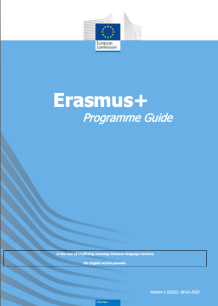Erasmus+ Programme Guide 2022

Erasmus+ is the EU Programme in the fields of education, training, youth and sport for the period 2021-2027. Education, training, youth and sport are key areas that support citizens in their personal and professional development. High quality, inclusive education and training, as well as informal and non-formal learning, ultimately equip young people and participants of all ages with the qualifications and skills needed for their meaningful participation in a democratic society, intercultural understanding and successful transition in the labour market. Building on the success of the programme in the period 2014-2020, Erasmus+ strengthens its efforts to increase the opportunities offered to more participants and to a wider range of organisations, focusing on its qualitative impact and contributing to more inclusive and cohesive, greener and digitally fit societies.
As the COVID-19 pandemic has shown, access to education is proving, more than ever, to be essential to ensuring a swift recovery, while promoting equal opportunities for all. As part of this recovery process, the Erasmus+ programme takes its inclusive dimension to a new horizon by supporting opportunities for personal, socio-educational and professional development of people in Europe and beyond, with the aim of leaving no one behind.
To increase the qualitative impact of its actions and ensure equal opportunities, the Programme will reach out more and better to people of different ages and from diverse cultural, social and economic backgrounds. It is at the heart of the Programme to come closer to those with fewer opportunities, including people with disabilities and migrants, as well as European Union citizens living in remote areas or facing socio-economic difficulties. In doing so, the Programme will also encourage its participants; in particular, young people to engage and learn to participate in civic society, raising awareness about European Union common values.